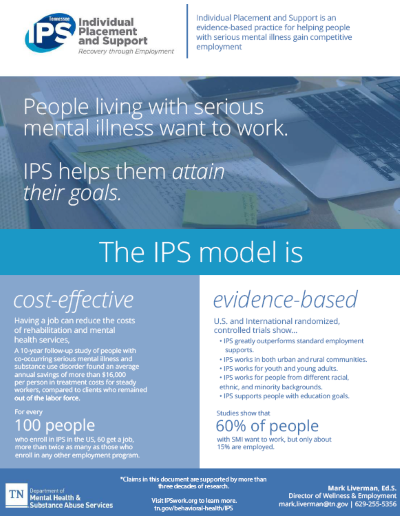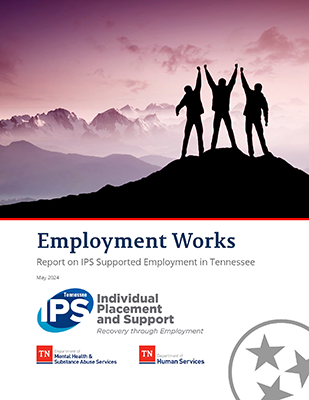Learn More About IPS Supported Employment
Tennessee began providing IPS Supported Employment services to individuals with severe mental illness in October 2013 at four agencies across the state. These pilot programs obtained support and funding from the Department of Human Services, Division of Vocational Rehabilitation (VR) and the Tennessee Department of Mental Health and Substance Abuse Services (TDMHSAS). In fiscal year 2026, IPS services expanded to 58 counties across Tennessee, 43 of which are in rural areas of the state and 15 in urban areas. There are 18 IPS supported employment providers, 15 of which partner with DHS/VR to deliver IPS services.
IPS services are now provided in all VR and TDMHSAS regions across the state as well. Since the IPS model is unique, Tennessee’s VR staff have taken great strides to ensure VR counselors collaborate closely with IPS Specialists to allow for better integration of services. VR counselors and IPS Specialists communicate frequently to ensure clients are receiving the support needed to reach their goals. VR has also made changes to their service processes and documentation requirements in order to better align services with the IPS model.
IPS Supported Education services were added in 2015 as part of mental health initiatives targeting youth and young adults. At this time, there are 15 IPS Supported Employment and Education Specialists serving youth and young adults across the state that are housed within grant programs for the First Episode Psychosis Initiative (FEPI), Juvenile Justice Reform (JJR), Healthy Transitions (HT), and Clinical High Risk for Psychosis (CHR-P). Tennessee has participated in research studies, some of which include the Social Security Administration study providing Supported Employment services to individuals who have been initially denied benefits and the NextGen study which looked at providing IPS to people recently released from incarceration.
Click this link or image to the right to download the print only Tennessee IPS Onepager.
Each IPS program in Tennessee collaborates with a Statewide IPS Trainer for ongoing support and technical assistance. The Trainers, along with TDMHSAS and VR, conduct fidelity reviews to determine the efficiency of each program and ensure the programs are implementing the IPS model effectively. Agencies are required to meet “good fidelity” when implementing the IPS model. Research shows that programs that align closely with fidelity have better client outcomes. The Trainers work alongside the agencies throughout the year to assist them in better implementing the model to serve more individuals and assist more people in reaching their goals.
Download our 2024 Employment Works Report at this link or by clicking the image at right.
TDMHSAS, VR, and the Trainers also work together to expand IPS services across the state through various taskforces and pre-implementation discussions with interested agencies. Tennessee has explored opportunities with Tennessee’s Medicaid authority (TennCare), the Department of Labor and Workforce Development, and other divisions within the Department of Human Services. Tennessee piloted an IPS program in conjunction with the Department of Human Services to provide IPS services to individuals receiving Families First benefits, which is Tennessee’s Temporary Assistance for Needy Families (TANF) program.
During the last fiscal year, 1,864 people with severe mental illness were served by IPS programs in the state. With the assistance of IPS Specialists, 42% of the individuals served were able to obtain jobs!
IPS Supported Employment is an evidence-based model of supported employment for individuals living with severe mental illness. The model currently has 28 randomized control studies confirming its success in assisting people with severe mental illness to obtain and sustain integrated, competitive employment. The extensive research provided by the IPS Employment Center, which originated from Dartmouth University, proves that the model is effective and proves superior to other types of supported employment services in assisting this population obtain and maintain employment. The model has a fidelity manual which includes a scale of 25 critical components for implementing the model appropriately. This manual and scale are used internationally to ensure programs utilizing this model are doing so effectively. The model has eight principles that set it apart from other types of supported employment, such as the philosophy of “zero exclusion” from services and using a stepwise approach to build relationships with employers in the community. The success of this model is attributed to its focus on individualized, client-driven services and time-unlimited support.
The IPS Employment Center has found that many young people and some adults have interest in school or vocational training as part of long-term employment goals. The addition of Supported Education to the IPS model provides guidance around supporting individuals with severe mental illness in finding and successfully completing mainstream educational or vocational training programs, such as high school, GED/HiSET programs, certificate programs (e.g. CDL, cosmetology, culinary arts), or college/university degree programs. Community-based career exploration is also part of Supported Education services and includes things like attending open houses at colleges or going to a job fair. Although there has not yet been significant research conducted on Supported Education services, it has been generally accepted as a best practice in providing support to individuals with educational goals.
The IPS Employment Center developed a practitioner’s guide titled The IPS Supported Employment Approach to Help Young People with Work and School to expand on services for young people in 2017. An adapted version of the IPS fidelity scale was released in 2019 due to findings that young adults needed more support with career exploration and education advancement. This 35-item scale adds engagement factors unique to the young adult population, such as utilizing texting to communicate with young adults and promoting employment and education via social media. Although it is similar to the original fidelity scale for IPS Supported Employment, this scale adds guidelines around providing IPS Supported Education services. This scale also promotes incorporating family and natural supports or supports identified by the young person throughout the process. Lastly, this scale considers that young people often are undecided on career goals, so fluidity is promoted throughout different work experiences and exploration of career paths is strongly encouraged.

